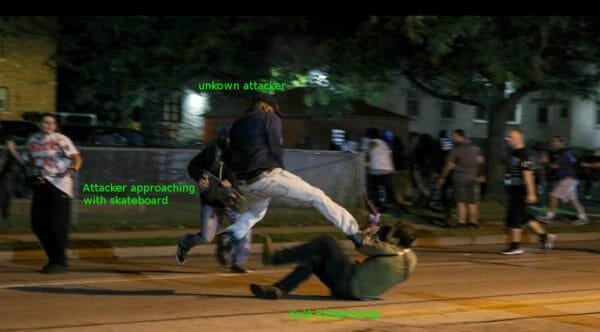
U.S.A. –-(AmmoLand.com)- On Thursday morning, 3 December 2020, the initial hearing on the Kyle Rittenhouse case was heard by Court Commissioner Loren Keating. The hearing started at 10:54 a.m., in a virtual hearing via video conferencing.
According to court records from the wicourts.gov:
10:54 AM Defendant, Kyle H. Rittenhouse, appeared with Attorney Mark D. Richards; Attorney Natalie Wisco. Attorney Tom Binger and Attorny Jason Zapf appeared for the Prosecution. Victim G.G. present with Attorney Kimberly Motley; victim J.H. present with Attorney Anand Swaminathan. Clerk – CJ. MINUTES: Court addresses the orders for pro hac vice admission signed by Br 3 and the objection that was filed by the State – Atty Binger states that objection does not need to be argued today; Atty Richards is in agreement but believes the objection was not timely; Court preserves the State’s objection to the pro hac vice admissions to be argued before the Judge if needed.
As to the motion to dismiss filed by Atty Richards – Arguments heard regarding Ct 6; motion denied by the Court in regards to Ct 6. Arguements heard regarding Ct 2; motion denied by the Court in regards to Ct 2.
State by Atty Binger called witness KPD Detective Benjamin Antaramian; sworn in and testified; cross-examination by Atty Richards; exhibits 1 -12 offered by Atty Richards. Atty Richards moves to enter all exhibits shown on the record; Exhibits 1-12 received by Court. ST rested and moved for bind over; arguments heard. Probable cause found; bound over for trial. Information to be filed within 30 days. Arraignment scheduled for January 5, 2021 at 01:00 pm.
The motions to dismiss counts 2 and 6 were denied at the initial hearing.
This indicates the judge believes some argument is to be made so that the prosecution can prevail on those counts.
- Count 2 is 941.30(1)1st-Degree Recklessly Endangering Safety.
- Count 6 is 948.60(2)(a) Possess Dangerous Weapon-Person < 18
Those two counts appear to this observer to be the weakest counts in a weak prosecution case. Here is 941.30(1) from Wisconsin statutes:
Recklessly endangering safety.
941.30(1) First-degree recklessly endangering safety. Whoever recklessly endangers another’s safety under circumstances which show utter disregard for human life is guilty of a Class F felony.
As Kyle fired to protect his own life and only hit the person who was attacking him, this statute does not appear to apply. Clearly, there was no “utter disregard for human life”, when he was protecting his own life. Kyle’s lawyers make the case in a slightly different manner in their motion to dismiss:
Further, conviction for violation of 941.30(1) requires a finding that an individual’s safety was endangered by the conduct of the defendant. As there are no facts in the criminal complaint exhibiting how Richard McGinnis’ safety was endangered by Rittenhouse, the complaint fails to allege facts which could allow a reasonable person to conclude that a crime was committed. Accordingly,Count 2 should also be dismissed.
I have covered 948.60(2)(a) extensively in a previous article. Kyle would appear to be covered by the exception in 948.60(3)(c).
Kyle’s lawyers make that case in the motion to dismiss. From the motion:
Section 948.60(3)(c) provides exemption for the prosecution of minors in possession of rifles or shotguns unless at least one of two conditions are satisfied. As neither condition is satisfied in this instance, the criminal complaint is insufficient and Count 6 should be dismissed.
The motion to dismiss is much longer than these short summaries. It is beautifully and clearly written and signed by Rittenhouse’s Lawyer Mark D. Richards.
Both motions to dismiss counts 2 and 6 were denied by Judge Keating, as shown in the court document.
Counts are sometimes dismissed in initial hearings. I asked a retired officer, who spent his career in Wisconsin, about it. He said it happened, but very rarely. He said it was more likely decades ago when judges were more willing to act as gatekeepers. He suspected it to be unlikely in a political case.
It did not happen in this case. The case is highly politicized and of national interest.
About Dean Weingarten:
Dean Weingarten has been a peace officer, a military officer, was on the University of Wisconsin Pistol Team for four years, and was first certified to teach firearms safety in 1973. He taught the Arizona concealed carry course for fifteen years until the goal of Constitutional Carry was attained. He has degrees in meteorology and mining engineering and retired from the Department of Defense after a 30-year career in Army Research, Development, Testing, and Evaluation.

